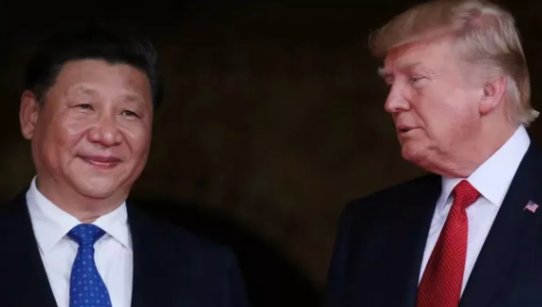Tariff War: Xi Jinping’s Stern Directive to Chinese Airlines – Is a Major Blow Coming for the U.S.?
Xi Jinping orders Chinese airlines to cut reliance on U.S. aircraft. Will Boeing suffer a major blow? Discover how this move impacts the U.S.-China trade war.

Tariff War: Xi Jinping’s Stern Directive to Chinese Airlines – Is a Major Blow Coming for the U.S.?
The ongoing tariff war between the world’s two largest economies — the United States and China — is once again making headlines. In a dramatic escalation, Chinese President Xi Jinping has reportedly issued a stern directive to Chinese airlines, urging them to reduce dependency on American aircraft manufacturers, particularly Boeing. This move has not only triggered tremors in the aviation sector but has also raised questions:
Is the U.S. staring at a major economic setback?
Let’s break down what this directive means, its implications, and how it fits into the larger geopolitical and economic rivalry between the two global giants.
Backdrop of the U.S.-China Trade War
The trade war officially began in 2018 under the Trump administration, when the U.S. imposed tariffs on billions of dollars’ worth of Chinese goods, citing unfair trade practices and intellectual property theft. China responded in kind, and the tit-for-tat tariff exchanges have continued — albeit at varying intensities — even under the Biden administration.
While sectors like technology, agriculture, and semiconductors have remained at the heart of this dispute, the aerospace industry has quietly become a new battleground.
Xi Jinping’s Directive to Chinese Airlines: What Happened?
According to recent reports, President Xi instructed state-owned Chinese airlines to:
- Curtail or freeze the purchase of aircraft from U.S.-based companies (mainly Boeing).
- Shift focus towards domestic aviation manufacturing, notably China’s state-backed COMAC (Commercial Aircraft Corporation of China).
- Prioritize Airbus orders over Boeing, giving an edge to European manufacturers.
This directive is part of a broader “Made in China 2025” initiative, which aims to make China self-reliant in key strategic sectors, including aviation.
Why This Move is a Big Deal
1. Boeing’s Heavy Dependence on China
- China is one of Boeing’s biggest customers, accounting for nearly 20% of its commercial aircraft deliveries.
- Any significant drop in orders from Chinese airlines could cost billions of dollars in lost revenue.
2. COMAC's Rising Ambitions
- China is aggressively pushing its homegrown aircraft C919, built to compete with Boeing 737 and Airbus A320.
- With government-backed subsidies and mandatory adoption by domestic airlines, COMAC could soon erode Boeing’s market share.
3. Airbus Gains an Advantage
- With Boeing at risk of losing Chinese business, Airbus (a European competitor) stands to benefit.
- China recently placed bulk orders with Airbus, signaling a strategic pivot.
???????? What This Means for the United States
The implications for the U.S. are multi-dimensional:
1. Economic Losses
- The U.S. aviation industry supports millions of jobs, both directly and indirectly.
- A decline in Boeing's global competitiveness could lead to job losses, reduced exports, and GDP contraction in related sectors.
2. Technological Edge at Risk
- If China becomes self-reliant in aviation, it could challenge U.S. technological supremacy, just like it has in the EV and 5G sectors.
3. Geopolitical Leverage Diminished
- Boeing deals have often been used as diplomatic tools in U.S.-China relations.
- Losing that leverage means reduced influence in future negotiations.
???????? China’s Strategy: Decoupling in Action
President Xi’s latest move is a part of China’s broader strategy of economic decoupling from the West. Here’s how:
Self-Reliance in Strategic Sectors
From semiconductors to renewable energy, space tech, and now aviation, China is determined to reduce dependence on Western technology.
State-Backed Expansion
With deep state funding and regulatory control, Chinese companies can afford to operate at lower margins or even losses to achieve strategic goals.
Global Expansion via Belt & Road
China’s C919 could be exported to developing nations within its Belt and Road Initiative, expanding its soft power and market reach.
How the U.S. Might Respond
The U.S. government and aviation industry are unlikely to take this lightly. Potential countermeasures could include:
- Incentivizing Boeing through subsidies or defense contracts.
- Pushing for COMAC sanctions or restrictions under export control laws.
- Expanding partnerships with allied countries to maintain global dominance.
The U.S. may also tighten scrutiny of Chinese investments in the aviation supply chain and limit technology sharing with firms connected to COMAC.
Expert Opinions: Is This a Tipping Point?
Aviation experts and trade analysts believe this is a strategic blow that could change the dynamics of the global aerospace industry.
“Boeing can’t afford to lose China. It’s not just about planes; it’s about global influence,”
— Aviation Industry Analyst, Washington D.C.
Some also believe that this is an opportune time for Boeing to diversify its customer base and focus more on India, Middle East, and African markets to compensate.
What Do the Numbers Say?
Here’s a quick look at how the numbers stack up:
|
Metric |
Boeing |
Airbus |
COMAC |
|
2023 Deliveries |
528 |
735 |
~20 (C919) |
|
Orders from China |
~$14 Billion |
~$18 Billion |
Growing |
|
China Market Share |
~40% |
~50% |
~10% (and rising) |
What Lies Ahead?
The aviation turf war is just one of many fronts in the broader U.S.-China rivalry. Xi’s directive is a signal — China is playing the long game. The U.S. must adapt quickly, leveraging alliances, investing in innovation, and keeping its strategic industries competitive.
As China ramps up its aviation ambitions, the skies are getting politically turbulent. Whether it leads to a crash or a course correction for Boeing and the U.S. economy depends on the next set of strategic decisions.
The tariff war is no longer limited to taxes and trade barriers. It’s about who controls the future of innovation, global supply chains, and economic influence. Xi Jinping’s recent move targeting the aviation sector is bold, calculated, and deeply strategic.
Will the U.S. respond with equal force, or is it already flying into headwinds?
What's Your Reaction?




















